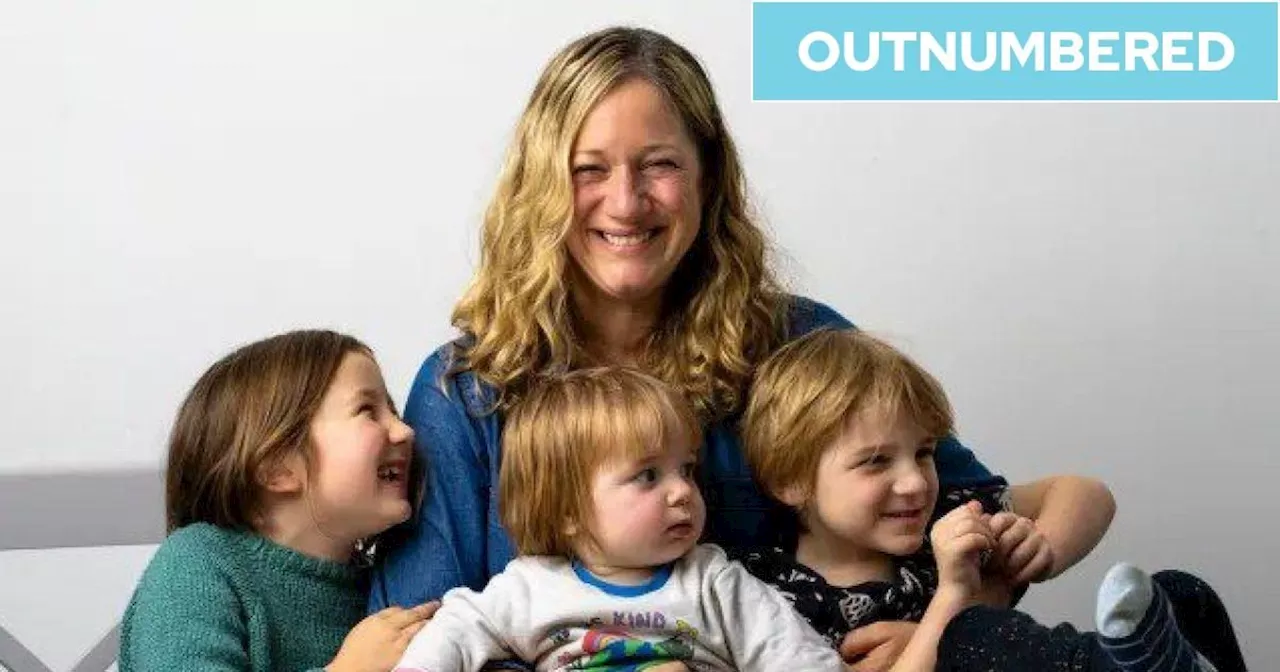It's Time to Talk Day 2025! Learn how to broach the subject of mental health with your child, and what to do if they're struggling to open up.
It's national Time to Talk Day 2025, but do you know how to talk to your child about how they're feeling and would you know what to do if you're unable to get them to open up to you? We asked the experts at mental health charity Mind for their top tips. Watching your child struggle with their mental health is extremely distressing for a parent, but it can also be difficult to know how to broach the subject and doing so can take both of you out of your conversation comfort zone.
While we might think young people these days are more in touch with their emotions and feelings than ever before, new data from Mind shows that 45% of today's teenagers and young adults (aged 16-24 years) say, compared to only 19% of 65-74 year olds. But talking to your child or teenager about their worries or mental health struggles is extremely important, so as their parent or carer it's up to you to make sure they feel comfortable doing so. From 3–9 February, is the perfect time to start broaching the subject with your child and take those first steps to ensure your child knows they can come to you for help whatever the problem in the future. Mind has shared some helpful tips for you on how to broach the subject of mental health with your child, whether they're already struggling or not. Time to Talk Day is the nation’s biggest mental health conversation. Taking place every year, it’s a day for friends, families, communities, and workplaces to come together to talk, listen and change lives. Not having conversations can have a negative impact on all aspects of life, including jobs, relationships, friendships and health. Mind, Rethink Mental Illness and Co-op are calling on people to get comfortable talking and start a conversation, however small, about how they are really feeling. Across the UK, Time to Talk Day is delivered by If you've noticed your child is struggling with something but they aren't opening up to you about it, it can be scary and stressful. However, it's important not show your stress or get agitated with your child and approach the matter carefully and thoughtfully. Sarah Hughes, CEO of Mind suggests the following steps: Consider different communication methods– give them your full attention and use open body language to show you’re engaged. If you've tried all of the methods above and your child still won't open up to you, you may need some extra help. 'If you feel worried that they may attempt suicide, or have seriously hurt themselves, this is an emergency,' says Sarah Hughes. 'You can call 999 and ask for an ambulance or go straight to A&E if you can.' If it's not an emergency but you're not making any progress opening up a channel of communication with your child, don't worry – sometimes telling people you love how you're feeling is the hardest thing of all and there are other ways to support your child. Mind suggests the following options: – sometimes, connecting with others who have similar experiences can be helpful. The earlier you can make talking about feelings and emotions a natural, everyday part of life for your child the easier it should be for them to come to you if they ever experience mental health problems in the future. Even if you're already navigating the mysterious world of teenagers, don't worry, it's never too late to start implementing some of these strategies from Mind below: – mental health changes all the time, so don’t wait until they’re struggling to start conversations. – they might want to talk about it, or they might not, but letting them know you’re there for them is just as important. Spending time with them, if you can, lets them know you care, and can help you understand what they're going through. – they will want support at different times and in different ways. This could be supporting them to exercise more or keeping track of medication or healthcare appointments. – try to be non-judgemental and listen. Someone experiencing a mental health problem often knows best what's helpful for them. – consistently show interest in their thoughts and feelings, even about small things. – talking about mental health and wellbeing with them is important but it's only one part of your lives. Keep talking about things you've always talked about together and treat them the same as before. It's impossible to 100% prevent your child suffering from mental health issues, however there are steps you can take to help reduce the risk. These include fostering a supportive home environment and encouraging healthy habits. 'Offer support for stressful things, like schoolwork and exams,' says Sarah Hughes. 'You can also help them take care of their wellbeing by encouraging activities like mindfulness, exercise, or pursuing creative outlets. Check up on their physical health too, like making sure they're eating well and sleeping enough.' As with all things in parenting, leading by example is also key to ensuring your child knows how to behave and react to their own mental health struggles. 'Talk about how you're feeling,' says Sarah Hughe
Mental Health Child Wellbeing Time To Talk Day Communication Support Teenagers Young Adults Parenting
United Kingdom Latest News, United Kingdom Headlines
Similar News:You can also read news stories similar to this one that we have collected from other news sources.
 Break the Stigma: 'Get Comfortable' Talking About Mental Health on Time to Talk DayTime to Talk Day, on 6 February, encourages open conversations about mental health to break down stigma and build understanding. The campaign promotes active listening and support, emphasizing the importance of creating a more inclusive and supportive environment for mental well-being.
Break the Stigma: 'Get Comfortable' Talking About Mental Health on Time to Talk DayTime to Talk Day, on 6 February, encourages open conversations about mental health to break down stigma and build understanding. The campaign promotes active listening and support, emphasizing the importance of creating a more inclusive and supportive environment for mental well-being.
Read more »
 Shropshire Farming Talk: Talking helps when life gets toughWith continuing pressure on the industry, intensified by a harsh wet winter and short days, many farmers are struggling to see the way forward.
Shropshire Farming Talk: Talking helps when life gets toughWith continuing pressure on the industry, intensified by a harsh wet winter and short days, many farmers are struggling to see the way forward.
Read more »
 Forensic Science Talk Explores 'Time of Death' Mysteries Using 'Forens-OMICS'Dr. Noemi Procopio, Senior Research Fellow in Forensic Science at the University of Central Lancashire, will give a free public talk on February 6th exploring how 'Forens-OMICS', a cutting-edge molecular analysis technique, can be used to determine the time of death in real-world cases. Dr. Procopio will discuss the challenges of pinpointing time of death, considering factors like body condition and environmental temperature, and highlight how minute details like DNA, proteins, and microbes can provide crucial insights in solving crimes.
Forensic Science Talk Explores 'Time of Death' Mysteries Using 'Forens-OMICS'Dr. Noemi Procopio, Senior Research Fellow in Forensic Science at the University of Central Lancashire, will give a free public talk on February 6th exploring how 'Forens-OMICS', a cutting-edge molecular analysis technique, can be used to determine the time of death in real-world cases. Dr. Procopio will discuss the challenges of pinpointing time of death, considering factors like body condition and environmental temperature, and highlight how minute details like DNA, proteins, and microbes can provide crucial insights in solving crimes.
Read more »
 My children are two, five and seven - it's time for the sex talkGenevieve Roberts' eldest children know they were conceived with a sperm donor - but she wonders when is too soon to start talking to them about sex education
My children are two, five and seven - it's time for the sex talkGenevieve Roberts' eldest children know they were conceived with a sperm donor - but she wonders when is too soon to start talking to them about sex education
Read more »
 Potter Frustrated By Constant Transfer Talk As West Ham Eye Final Day DealWest Ham manager Graham Potter expressed his frustration with repeated questions about transfers during a recent press conference. With the January transfer window closing on Monday, West Ham are expected to be active in the market, particularly in their quest for a new striker. Brighton's Evan Ferguson is reportedly a target for the Hammers, but Potter refused to comment on any potential deals. He emphasized his focus on the current squad and his desire to avoid speculation.
Potter Frustrated By Constant Transfer Talk As West Ham Eye Final Day DealWest Ham manager Graham Potter expressed his frustration with repeated questions about transfers during a recent press conference. With the January transfer window closing on Monday, West Ham are expected to be active in the market, particularly in their quest for a new striker. Brighton's Evan Ferguson is reportedly a target for the Hammers, but Potter refused to comment on any potential deals. He emphasized his focus on the current squad and his desire to avoid speculation.
Read more »
 Coffee CAN protect against deadly heart disease – but the time of day is important, study says...What is high blood pressure and what is a normal reading?
Coffee CAN protect against deadly heart disease – but the time of day is important, study says...What is high blood pressure and what is a normal reading?
Read more »
